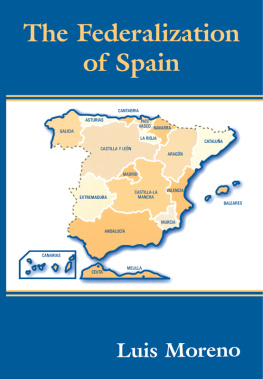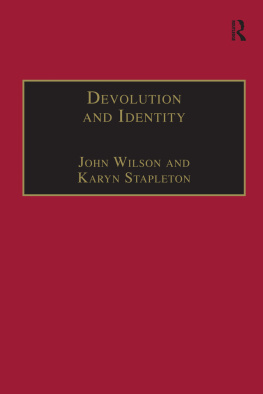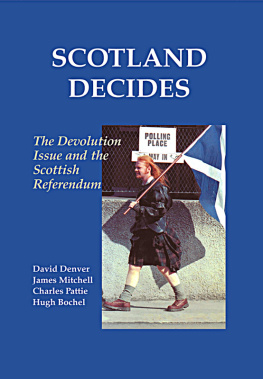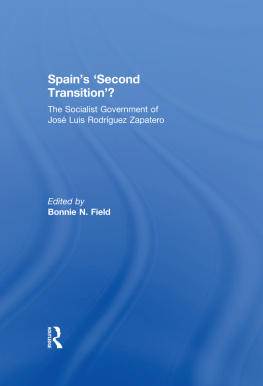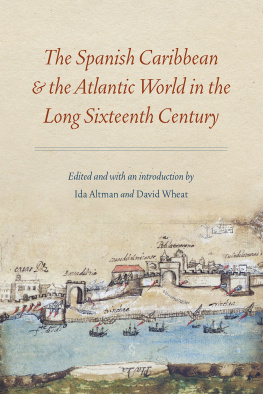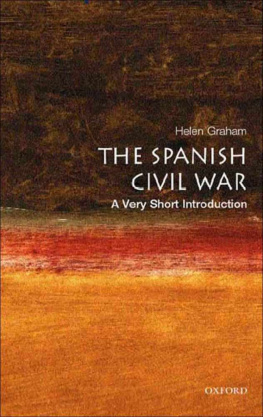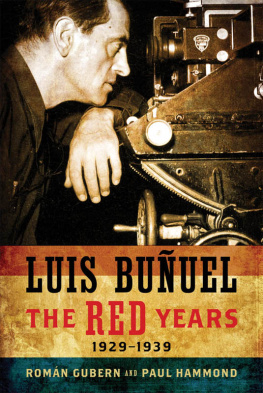THE FEDERALIZATION OF SPAIN
THE CASS SERIES IN REGIONAL AND FEDERAL STUDIES
ISSN 1363-5670
General Editor: John Loughlin
This series brings together some of the foremost academics and theorists to examine the timely subject of regional and federal issues, which since the mid-1980s have become key questions in political analysis and practice.
The Political Economy of Regionalism
edited by Michael Keating and John Loughlin
The Regional Dimension of the European Union: Towards a Third Level in Europe?
edited by Charlie Jeffery
Remaking the Union: Devolution and British Politics in the 1990s
edited by Howard Elcock and Michael Keating
Paradiplomacy in Action: The Foreign Relations of Subnational Governments
edited by Francisco Aldecoa and Michael Keating
The Federalization of Spain
by Luis Moreno
First published 2001 by Frank Cass Publishers
Published 2013 by Routledge
2 Park Square, Milton Park, Abingdon, Oxon OX14 4RN
711 Third Avenue, New York, NY, 10017, USA
Routledge is an imprint of the Taylor & Francis Group, an informa business
Copyright 2001 Luis Moreno
All rights reserved. No part of this book may be reprinted or reproduced or utilised in any form or by any electronic, mechanical, or other means, now known or hereafter invented, including photocopying and recording, or in any information storage or retrieval system, without permission in writing from the publishers.
British Library Cataloguing in Publication Data
Moreno, Luis
The federalization of Spain. (The Cass series in regional and federal studies; no. 5)
1. Federal government Spain 2.Decentralization in
government Spain 3.National liberation movements Spain
4.Spain Politics and government 20th century
I. Title
321. 020946
ISBN 13: 978-0-714-65138-5 (hbk)
ISBN 13: 978-0-714-68164-1 (pbk)
Library of Congress Cataloging-in-Publication Data
Moreno, Luis (Moreno Fernndez)
[Federalizacin de Espaa. English]
The federalization of Spain / Luis Moreno.
p. cm. (The Cass series in regional and federal studies, ISSN 1363-5670; 5)
Rev. translation of: La federalizacin de Espaa.
Includes bibliographical references and index.
ISBN 0-7146-5138-9 (cloth) ISBN 0-7146-8164-4 (pbk.)
I. Federal government-Spain. 2. Regionalism-Spain. 3. Nationalism-Spain.
I. Title. II. Series.
JN8231 .M6213 2000
320.946-dc21 00-047582
Contents
The last couple of decades have witnessed far-reaching changes of state, economy and society which have affected the nature and functioning of political systems. The main forces bringing about these changes are various kinds of globalization economic, financial, cultural and technological change; increasing macroregional integration, for example, the strengthening of the European Union and the North American Free Trade Agreement accompanied by, paradoxically, more societal fragmentation. The end of the Cold War with the collapse of the Soviet Union have also changed the geopolitical context in which states now operate. One of the most striking features of this recent period of history has been the growing importance of regions, whether understood as political governments, administrative entities or as units of economic or cultural life. For a short period, at the end of the 1980s, the old federalist slogan of a Europe of the Regions was resurrected and seemed for a while to herald a new political role for regions in a new federalized Europe. Although this has not come to pass and scholarly and political evaluation of the role of regions in a Europe polity is now more modest, nevertheless, regions have still managed to garner for themselves a new legitimacy and have become once again a focus of political activity and repositories of identity not replacing nationstates, but alongside and nested within them and the overarching polity of the European Union. The success of the regional idea and regionalism as a political ideology might be gauged from the fact that, in western Europe at least, all of the large nation-states have regionalized Italy, Spain, France and, most recently, the United Kingdom while there are pressures on the smaller unitary states, such as Ireland, Portugal and Greece, traditionally resistant to regionalism, to follow suit.
It is less clear whether federalism, as a political philosophy and movement, has been as successful as regionalism. It is true that the largest European state, Germany (as well as Austria), has been a member of the democratic family of states at least partly because of its successfully functioning federal system. Nevertheless, federalism, as a political philosophy, and federations, as forms of political organization, form an important backdrop to current developments not just in Europe but in other parts of the world. Indeed, federalism constitutes part of the intellectual underpinnings of the European Union itself and has tended to be forgotten in current debates between neofunctionalists, neo-institutionalists, liberal intergovernmentalists and multilevel governance theorists. Furthermore, there is sometimes a fine line between regionalized states, such as Italy and Spain, and federal states. The United Kingdom is both devolving political power internally and evolving new relationships externally with the Republic of Ireland. These new internal and external relations are simultaneously regional, federal and confederal. In Italy, the recent constitutional reforms were initially labelled a form of federalism although it clearly has not become a traditional federation. The merit of The Federalization of Spain by Luis Moreno is that it examines the Spanish case from a federalist perspective and attempts in so doing to introduce some clarity into what has become a conceptually murky field. Moreno analyses the Spanish case through two important conceptual lenses: the debate on regionalism, nationalism and federalism; and the historical development of the Spanish state. His discussion of the theoretical debate allows him to formulate a number of concepts which can be usefully applied to Spain: devolutionary federalism; competitive versus concurrential regionalism; and, finally, the application of the notion of dual identity, which is Morenos main previous contribution to the political science literature on the problem of federalism. The development and empirical application of these concepts will be useful not simply for the Spanish case but also for further comparative studies as contemporary states, such as the United Kingdom, struggle to adapt their territorial arrangements to meet the challenges of modern governance.
John Loughlin
University of Cardiff
My thanks go first to the Direccion General de Poltica Cientfica Programa de Movilidad Temporal de Personal Investigador (Spanish Ministry of Education) for financial support. Likewise, I am grateful to the hospitality of the University of Colorado at Boulder and, in particular, to the Department of Political Science and the Center for Comparative Politics at the time I wrote the first manuscript of this book in Spanish.
I am grateful to Ricard Giner i Sariola, Kerstin Hamann, Jos Luis Lujn and Barbara Stewart, who read early versions of this text and offered me valuable comments on it. I wish to express my special gratitude to Salvador Giner, as well as to Ana Arriba and Ajraceli Serrano, with whom I have collaborated on earlier works on centre and periphery and multiple identities in Spain.

